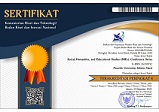Analysis of Educational Curriculum in Indonesia and Morocco: Comparing Content, Implementation and Impacts on Learning
Abstract
This research aims to analyze the education curriculum in Indonesia and Morocco, focusing on content, implementation, and impacts on learning. Through qualitative research, including document analysis and interviews with educators, curriculum developers, and students, this study compare the educational curriculum of both countries. The analysis begin with exploring official curriculum documents in both countries, examining objectives, subjects, and teaching methods. The implementation of the curriculum examined through observations and interviews with educators to understand how it is enacted in the classroom. Additionally, interviews with students gather their perceptions and experiences regarding the curriculum's impact on their learning outcomes. The results of this study are Indonesia and Morocco have some fundamental similarities and differences in the applicable curriculum. Indonesia and Morocco prioritize student-centered learning, skills development, and character education through initiatives like the Merdeka Curriculum. Despite promoting accessibility and technology use, both face challenges in addressing regional disparities. The primary school curricula in both nations positively impact learning by emphasizing competencies, general skills, and character education, while recognizing and appreciating local values and culture. The findings of this research contribute to the education sector by providing a comprehensive comparison of the curriculum between Indonesia and Morocco.
Keywords
Full Text:
PDFRefbacks
- There are currently no refbacks.





